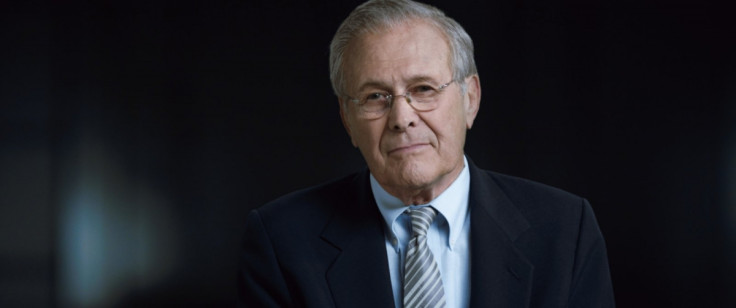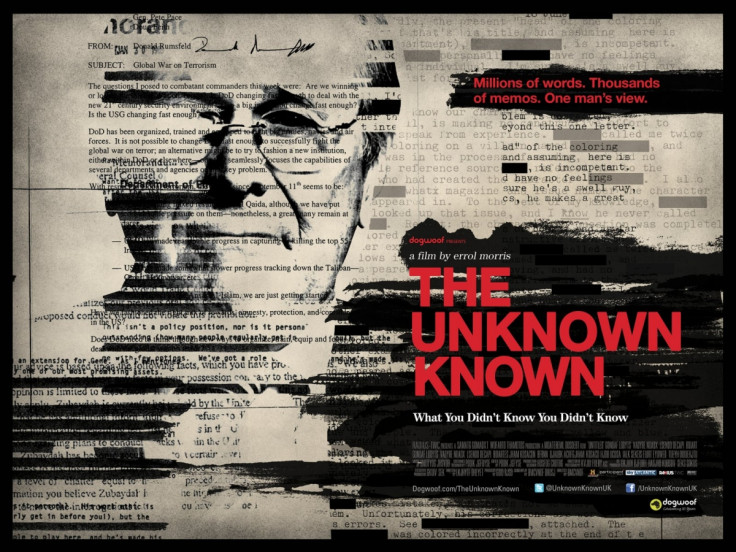Unknown Known Review: Documentary Interrogates Donald Rumsfeld over Iraq War

Errol Morris, American documentary filmmaker extraordinaire, dazzled audiences when in 2003 he released The Fog of War, an astonishing Oscar-winning movie in which former US defence secretary Robert McNamara is asked to outline the lessons of warfare he learned from his time spent spearheading US involvement in the Vietnam War.
In a moment of candour that unravelled preconceptions, McNamara said that no matter how much is known in a war, it is never enough to guarantee victory.
Morris has now made The Unknown Known, a spiritual sequel of sorts that attempts to get inside the head of the more recent, and certainly more controversial, hawkish defence secretary Donald Rumsfeld. This time directly linking US foreign policy from Vietnam to Iraq, it's an enlightening picture full of ambition, but blighted by both Rumsfeld's defensive demeanour and a lack of focus.
Morris here seizes on the thousands of memos, called "snowflakes", that Rumsfeld sent during his time serving under presidents Gerald Ford and president George W Bush, and a particular one in reference to his now infamous quote regarding known knowns, unknown unknowns, and known unknowns.
The one missing off the list are the unknown knowns — things that you possibly may know that you don't know you know. It's a beautifully contradictory web of words that speaks of how through the use of language, and his approval of torture policies at Guantanomo Bay that filtered through to Abu Ghraib, Rumsfeld is a terrifying real-life incarnation of Big Brother.
Here, Morris ties Rumsfeld's two terms as foreign secretary, from Vietnam to Iraq, Watergate to WMDs, to present how major decisions have been shaped not by knowledge, but by opinions, or, as Rumsfeld calls them, "decisisons".

Rumsfeld faces the "interretron", the patented camera device by Morris which allows the subject to look and respond directly to the interviewer, giving the audience the impression that the subject is speaking straight at them, to answer questions and read some of his memos.
It's all dexterously tied together with abstract imagery of a Washington snowglobe, aerial shots of important locations, and dictionary definitions appearing in big bold letters. Are the mistakes by the US Department of Defense, from Pearl Harbor to 9/11 to the invasion of Iraq, a failure to recognise the facts, or a failure to interpret them? Do people in positions of such power as Rumsfeld shape history or be shaped by them? These are big questions asked by Morris, but none seem to squarely hit the target.
The problem lies in that Rumsfeld just isn't as captivating as McNamara. Whilst he saw The Fog of War as a form of repentance, an education in the lack of knowledge even those at the very top have, Rumsfeld is downright unapologetic over Iraq and far more cautious in how he answers to it.
It's this continued recognition in his work that the world is dictated by perspective, by belief over knowledge, that makes Morris the most exciting documentary filmmaker alive.
Like his famed press conferences, or the thousands of memos he sent in his time in office, his answers always bare the careful construction of someone who seeks at all time to control the situation.
"I'm cool and measured," says Rumsfeld to an increasingly incredulous Morris, coldly saying that even his marriage was, "a decision". He refuses to bite when asked if like the works of Shakespeare, character defects drive history, instead insisting that all decisions boil down to perspective.
It's this continued recognition in his work that the world is dictated by perspective, by belief over knowledge, that makes Morris the most exciting documentary filmmaker alive. Through analysing Rumsfeld's use of memos and insistence on dictionary definitions, we are given a glimpse of how major decisions are based on one man's limited information, but also how people such as Rumsfeld use language to obfuscate facts to interpret their own version of the truth.
Whilst with MacNamara you were made aware of the lack of intelligence in warfare to make the most informed decisions, here it is the excess of information provided by Rumsfeld in these snowflake memos that made it possible for him to discern his own truth from the multitude of facts. Perhaps it should have been called The Blizzard of War.
The Unknown Known will be released in UK cinemas nationwide from 21 March. To find out more infromation about the film go to https://dogwoof.com/theunknownknown
© Copyright IBTimes 2025. All rights reserved.






















